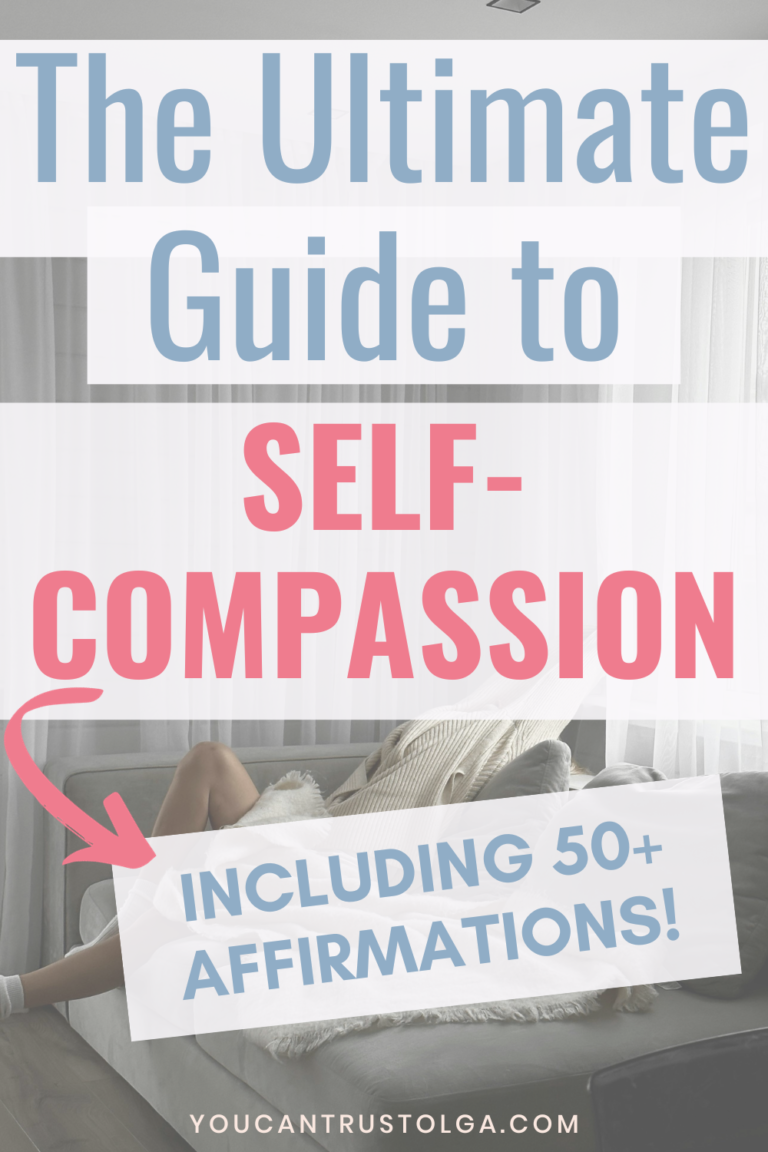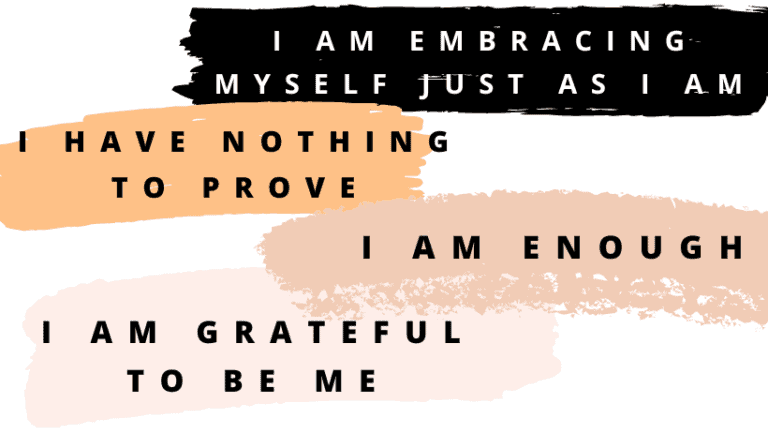Despite its appeal and growing popularity, the concept of self-compassion remains somewhat unclear for many people. Although it has been widely discussed, the practical application of it can be hard to comprehend.
This article is here to clear up the confusion, explaining what self-compassion really means and offering practical tips on how to apply it in your life.
From understanding the core principles to incorporating self-compassion affirmations into your daily life, I’ll cover for you the practical aspects of this transformative practice. Let’s get to it!

what is self-compassion
In a world that highly values perfectionism and promotes the pursuit of excellence, self-compassion emerges as a crucial antidote to the inner mental and emotional turmoil we often face.
Self-Compassion Misconception
For many individuals, the idea of self-compassion may still be misconstrued as a WEAKNESS, something incompatible with the pursuit of success.
Contrary to this belief, understanding your own feelings and fostering a friendly attitude towards yourself—essentially, practicing self-compassion—is a source of great strength.
Shifting away from outdated thinking and embracing a mentality of kindness towards oneself is not only the most fulfilling but also the easiest way to achieve any goal.
The definition of self-compassion includes:
- Understanding your own emotions,
- Accepting your own needs, and
- Respecting your personal limitations.
It’s about cultivating a nonjudgmental attitude toward your flaws, shortcomings, and mistakes—an approach that encourages embracing your imperfections.
“Embracing the imperfection you are” – it’s a refreshing mindset shift worth exploring, don’t you think so?
3 Pillars of Self-Compassion
1. Mindfulness: recognizing a moment of suffering
This involves recognizing and acknowledging your feelings and emotions, particularly the negative ones, and expressing them verbally.
The originator of self-compassion scales Dr. Kristen Neff states that “Mindfulness is a non-judgmental, receptive mind state in which one observes thoughts and feelings as they are, without trying to suppress or deny them.”
2. Common humanity: understanding suffering as a part of life
Suffering is common to all humans. It is a part of life and everyone experiences difficulties, failures, and setbacks. No human being is ever immune to that.
We all are:
- mortal,
- aware of our own finiteness,
- vulnerable, and
- imperfect.
3. Self-kindness: treating yourself with compassion
Being kind to yourself involves showing gentleness during challenging moments instead of harsh self-criticism. It’s the recognition that making mistakes is part of the journey and that self-compassion is crucial for both personal growth and success.
So, ask yourself: CanYou be kind to yourself?
how to practice self-compassion
Putting self-compassion to practice can feel like entering uncharted territory. Not only it is not the easiest thing to do, it is also counterintuitive to us.
Our default settings condition us to address ourselves mainly through judgment and criticism. But one day it has to become evident how little such approach serves us.
So the question is: How can we build our self-compassion muscles and become more kind and understanding towards oneself?
"Self-Compassion" by K. Neff
Learn the basics of self-compassion from the pioneer who coined the term - Dr. Kristin Neff. With her expertise and guidance, you can learn how to cultivate self-compassion in your daily life. Whether you're struggling with difficult emotions or feeling overwhelmed by expectations, Dr. Neff's approach can help you find peace and understanding within yourself.
Techniques For Practicing Self-Compassion
Self-Compassion Meditation
You might be familiar with meditation, which comes in various forms and serves as a tool to quiet the mind and foster presence in the moment. Some apps and websites specifically offer self-compassion meditation. These often include guided sessions lasting anywhere from five to 30 minutes.
You can start anywhere by simply choosing short and easy to follow self-compassion guided meditation on youtube.
Self-Compassion Letter
Everyone has aspects of themselves that they dislike, things that trigger feelings of shame, insecurity, or inadequacy. This is how you target that through a self-compassion letter exercise.
SELF-COMPASSION LETTER TECHNIQUE
Identify an issue that makes you feel negatively about yourself—a mistake, appearance concerns, relationship struggles, etc.
Now, envision another person in your life, whether real (like a friend or family member) or imagined, who is unconditionally loving, accepting, kind, and compassionate. This individual understands the limits of human nature and extends kindness, acceptance, and forgiveness.
Write a letter to yourself from the viewpoint of this person, expressing their feelings toward you regarding this issue. What words of kindness would they use to offer emotional support and encouragement without giving advice?
Pausing For Self-Compassion
Pausing is a powerful technique that helps you to slow down in life and become keenly aware of your own existence. Incorporate pausing into your daily life, by making it a mental habit.
“When you face challenging or highly emotional situation close your eyes briefly, ground yourself with a few deep breaths, and consciously observe your feelings.
Acknowledge the moment of distress by saying to yourself, “Wow, I am really suffering right now,” or “This is really painful/difficult.” Explore the emotions within your body without labeling or judging yourself.”
So,
- stop resisting negative emotions
- be open to different parts of your being, and
- remind yourself that this, too, is a part of you.
Journaling for Self-Compassion
Journaling is a powerful method for expressing emotions and has been shown to improve both mental and physical well-being.
Each evening, take a few quiet moments to reflect on the day’s events. In your journal, jot down anything that made you feel uneasy, instances where self-judgment occurred, or any challenging experiences that caused emotional distress.
“For example, if you found yourself getting angry at your friend being late again, leading to a rude or sarcastic comment, resulting in subsequent feelings of guilt and self-blame, document it.”
For each event, employ mindfulness, a sense of shared humanity, and kindness to reevaluate the situation through a more self-compassionate lens.
Self-Compassion Affirmations
We all know that affirmations, in general, are used as an effective psychological tool, and almost everyone is familiar with it. Usually, they are short mantras or quotes-like sentences by repeating which we can reprogram ourselves for a desirable change.
Self-compassion affirmations are no different. Only they are designed to develop empathy and kindness towards oneself.
CRAFTING SELF-COMPASSION AFFIRMATIONS
Certainly, crafting personalized affirmations is strongly recommended as it can resonate deeper within you and reflect your specific values. Why settle for generic affirmation quotes that don’t mirror your beliefs when you can create something meaningful?
Indeed, it is worth the effort and time to carve your own mantras that are uplifting, reassuring, and immensely gratifying specifically for YOU.
When crafting self compassion affirmations follow a few rules:
- make it simple
- make it short
- avoid negatives ( e.g.not, no)
- start with “May I”, “I am”, “I will”, “I can”, etc.
The key is to keep the tone light and inspiring while utilizing words that truly speak out to who you are as a person. Take your time with it – an affirmation that comes from within deserves delicate carving.
EXAMPLES OF A SELF-COMPASSION MANTRA
When you are going through a tough situation or an unpleasant moment:
Acknowledge your experience by saying
- This hurts
- Ouch
- This is stress
- I am scared
- I feel anxiety
- It is unpleasant
- I am in distress
- I am overwhelmed
- I feel alone
Remind yourself that suffering is a part of life with the next phrases
- Other people feel this way
- I am not alone
- We are all in this together
- We all struggle in our lives
- Everyone suffers
Give yourself kindness and support by saying
- May I be kind to myself
- May I forgive myself
- May I give myself the compassion that I need
- May I learn to accept myself as I am
- May I be patient
- May I love myself
- May I take good care of myself
- May I give myself some rest
ready-to-use self-compassion affirmations
Making change isn’t always the easiest thing to do. But if you are reading this article that means you are looking for alternative routes in your life. And although you might feel a bit indecisive at first and tempted to stick to old ways, believe me, this new journey is absolutely worth it.
In order to help, here are some premade and ready-to-use self compassion phrases examples for you. Feel free to borrow them and use them to your benefit. I hope it will help.
- I am worthy of kindness and respect.
- I will be gentle with myself when things don’t go as planned.
- It is okay to make mistakes; this does not define me.
- Life isn’t perfect, but it’s still beautiful.
- I am allowed to make mistakes without judgment
- It doesn’t have to be perfect
- It is not the end of the world
- Today I will forgive myself if I don’t cross off every item on my to-do list
- I am worthy of love and belonging
- I accept myself exactly the way I am right now
- I am enough
- I am grateful to be in this physical body
- What do I need right now?
- How do I feel at this moment?
- I take good care of myself
- I listen to myself
- I deserve some rest
- How can I make myself feel better at this moment?
- I am advocating for myself
- I can never get it wrong
- I can never get it done
- I did everything right
- I did today what I couldn’t do yesterday
- I am on my side
- I don’t have to prove anything to anyone
- I am sufficient
- I can be loved
- I am loved
- I am doing as best as I can
- All is well
- I am present
- I am concentrated only on myself and my progress
- Small progress is still progress
- There is nothing that I need to change
- There is nothing to be done
- I am accepting every moment just the way it is
- Today I will show myself some loving kindness
- I give up any struggle to achieve unachievable
- I give up, I give up, I give up
- And that shall pass
- Things are always working out for me
- All is well
- I am becoming a better friend to myself
- My opinion is the only one that matters
- I am not my mistakes
- I am not my feelings
- I am not my thoughts
- I am recognizing my weaknesses and my strength and I am accepting them
Examples of practicing Self-compassion
Read and ponder the next examples of self-compassion.
- Not beating yourself up after failing, making a mistake, or not achieving expected results.
Instead, find ways to celebrate small accomplishments. This can be something as simple as telling yourself “That was a great effort” or “I’m so proud of how hard I worked.” “Yes, I failed, but I failed better this time”.
- Being patient with yourself when learning something new.
Instead of being overwhelmed and feeling uneasy, congratulate yourself that now you know a bit more than you did yesterday. “It takes time to learn something new”, “I am happy I am doing it”, “It will become easier later”.
- Being kind and understanding of yourself when you experience a difficult emotion.
Instead of judging or criticizing, acknowledge the feeling and give yourself permission to take some time for yourself. You can say something like “Ouch, this hurts” or “I feel anxious now”.
- When comparing yourself or your life with someone else.
Remind yourself that believing the grass to be greener elsewhere is an illusion. Think of how wonderful it is to be in YOUR body, how nice it is to experience life, and how imperfectly perfect you are. Note, that your life path is unique and be amazed by how every day unfolds behind your eyes. Thank the universe for your own journey.
- When trying to accept yourself for who you are.
Instead of being hard on yourself for not being “perfect” in every area of your life, learn to love and accept yourself just the way you are. Remind yourself that perfection is a false social construct. “I am unique”, “I am worthy”, “It is good to be me”.
The above 5 ways to show self compassion are only a few of the many ways to help you get in touch with yourself, but you got the idea.
It is a completely different mindset that at first may sound very strange and weird to you. (Sadly, we humans of the twenty-first century find self kindness counterintuitive).
But believe me, it is only a matter of time and consistent application before it starts to make perfect sense and becomes natural.






